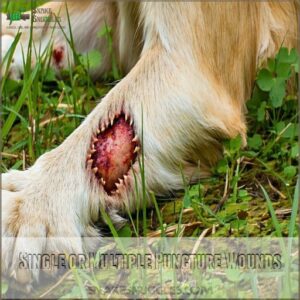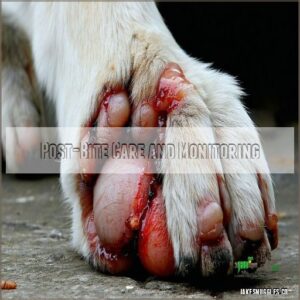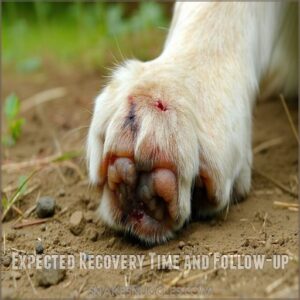This site is supported by our readers. We may earn a commission, at no cost to you, if you purchase through links.
 Yes, a rattlesnake can absolutely kill a dog—and it happens faster than you might think.
Yes, a rattlesnake can absolutely kill a dog—and it happens faster than you might think.
Dogs are 25 times more likely to die from rattlesnake venom than humans.
The snake’s potent hemotoxin attacks your dog’s blood, tissues, and organs, causing rapid swelling, bleeding, and potential organ failure.
Immediate veterinary care is your dog’s lifeline, with antivenom treatment being essential within the first critical hours.
Your pet’s survival depends on swift recognition of symptoms like puncture wounds, excessive drooling, and altered breathing. The clock starts ticking the moment that venomous strike lands.
Table Of Contents
- Key Takeaways
- Rattlesnake Poisoning and Dogs
- Can a Rattlesnake Kill a Dog?
- Rattlesnake Venom Effects
- Factors Affecting Dog Survival
- Signs of a Rattlesnake Bite
- Effective Treatments for Rattlesnake Bites
- Prevention and Risk Factors
- Importance of Prompt Veterinary Care
- Post-Bite Care and Monitoring
- Expected Recovery Time and Follow-up
- Frequently Asked Questions (FAQs)
- Can a rattlesnake kill a dog?
- Can a dog survive a rattlesnake bite?
- Can a snake bite kill a dog?
- What happens if a dog bites a rattlesnake?
- Are venomous snakes dangerous to dogs?
- Are Mojave rattlesnakes poisonous to dogs?
- How long does snake venom take to kill a dog?
- Do dogs know to stay away from rattlesnakes?
- Can a copperhead kill a dog?
- Can dogs survive a rattlesnake bite?
- Conclusion
Key Takeaways
- Your dog’s survival after a rattlesnake bite depends on lightning-fast veterinary intervention, with treatment within the first critical hour dramatically increasing survival chances by over 80%.
- Dogs are 25 times more likely to die from rattlesnake venom than humans, making it essential to recognize immediate symptoms like puncture wounds, excessive drooling, and rapid swelling.
- The snake’s potent hemotoxin can destroy your dog’s blood cells, tissues, and organs in minutes, causing potentially fatal complications if antivenom isn’t administered quickly.
- Prevention is key: train your dog on leash control, be aware of snake habitats, and consider rattlesnake vaccination as an additional layer of protection against these deadly encounters.
Rattlesnake Poisoning and Dogs
If you’re a dog owner, a rattlesnake bite can turn a peaceful walk into a life-threatening emergency in mere moments.
Understanding the critical signs of rattlesnake poisoning and acting swiftly can mean the difference between your furry friend’s survival and a tragic outcome.
Immediate Symptoms and Warning Signs
When your dog encounters a rattlesnake, quick symptom recognition could mean the difference between life and death.
Rattlesnake bites trigger immediate, alarming reactions that demand your full attention:
- Intense localized pain at the bite site
- Rapid, excessive drooling and panting
- Visible puncture wounds with potential bleeding
- Sudden swelling around the bite area
- Dramatic changes in breathing pattern
Stay calm and act fast – your dog’s survival depends on it.
Delayed Symptoms and Systemic Complications
After initial bite symptoms, your dog might face a sneaky storm of delayed complications.
Rattlesnake venom can trigger systemic devastation hours or days later, targeting key organs like a silent predator.
Blood clotting disorders emerge, kidneys and liver might shut down, and internal bleeding can develop without warning.
Don’t let your guard down – these hidden dangers demand vigilant monitoring.
Neurological Abnormalities and Seizures
Those pesky neurotoxins can turn your dog’s nervous system into a battlefield, triggering brain swelling and potentially devastating neurological damage.
If you suspect your dog has been bitten by a rattlesnake, it’s essential to have a dog seizure rattlesnake emergency kit supplies on hand.
Seizure types range from mild tremors to full-blown convulsions, leaving your furry friend vulnerable to paralysis.
The venom’s toxic punch can scramble neural signals, creating a terrifying cascade of neurological complications that demand immediate veterinary intervention to prevent long-term effects.
Can a Rattlesnake Kill a Dog?
Yes, a rattlesnake can absolutely kill your dog if you don’t take swift action after a venomous bite.
Understanding the critical factors of snake type, bite location, and immediate treatment can mean the difference between life and death for your furry companion.
Severity Factors and Mortality Rate
Rattlesnake bites can turn deadly for dogs in a heartbeat, with survival hanging by a thread depending on critical factors. Your furry friend’s life depends on understanding key mortality risks:
- Venom potency varies dramatically between snake species
- Dog’s body size greatly impacts survival chances
- Bite location determines potential systemic damage
- Treatment delay can dramatically reduce recovery probability
The clock ticks mercilessly when venomous fangs strike.
Prompt Treatment and Survival Rate
When seconds count, your dog’s survival hangs in the balance after a rattlesnake strike. Swift action dramatically boosts survival odds, with treatment speed being the game-changer between life and death.
| Survival Factor | Impact |
|---|---|
| Treatment Time | Critical |
| Venom Amount | Determines Severity |
| Dog’s Weight | Influences Prognosis |
Venom’s unpredictable nature means every moment matters in this high-stakes battle for your furry friend’s life.
Importance of Immediate Veterinary Care
Within moments of a rattlesnake bite, your dog’s survival hinges on lightning-fast veterinary intervention.
Emergency care dramatically improves survival odds, with antivenom administration being critical.
Treatment speed directly impacts recovery, potentially preventing long-term venom effects.
Cost shouldn’t deter immediate action—emergency veterinarians can manage expensive treatments through payment plans or pet insurance.
Rattlesnake Venom Effects
When a rattlesnake strikes your dog, its venom releases a complex biochemical assault.
This assault can quickly compromise your pet’s health, targeting blood cells, tissues, and important organ systems.
You’ll want to understand these venom effects to recognize the potential life-threatening consequences and take immediate action.
Immediate action could mean the difference between survival and tragedy.
Hemotoxic Effects on Blood Clotting
You’ve got mere minutes to understand how a rattlesnake’s venom wreaks havoc on your dog’s blood clotting system. A complex cocktail of enzymes disrupts the clotting cascade through four devastating mechanisms: This is characteristic of viper venom’s hemotoxic properties, which involve snake venom metalloproteinases.
- Destroying platelet function
- Breaking down blood vessel walls
- Preventing normal coagulation
- Triggering uncontrolled bleeding responses
Veterinary coagulation tests become critical in evaluating the venom’s destructive potential and guiding immediate treatment strategies.
Tissue Damage and Necrosis
Rattlesnake venom delivers a devastating assault on your dog’s tissue, triggering rapid cellular destruction and potential necrosis. This toxic attack transforms healthy tissue into a dangerous, decaying landscape.
Effective snake bite treatment products can help minimize the damage, such as those found at snake bite treatment kits.
| Tissue Damage Stage | Potential Impact |
|---|---|
| Initial Injury | Immediate cellular death |
| 24-48 Hours | Spreading inflammation |
| 3-5 Days | Potential permanent scarring |
| 1 Week+ | Risk of surgical intervention |
Prompt treatment prevents permanent damage and preserves your furry friend’s health.
Systemic Complications and Organ Failure
When venom strikes, it’s like a silent storm ravaging your dog’s internal systems.
Coagulopathy triggers cascading organ failures, with kidney injury and liver damage potentially leading to cardiac arrest.
Respiratory distress can quickly follow, transforming a rattlesnake poisoning into a life-threatening emergency that attacks multiple organ systems simultaneously, threatening your furry friend’s survival.
Factors Affecting Dog Survival
When your dog encounters a rattlesnake, survival depends on three critical factors: the snake’s venom potency, your dog’s unique characteristics, and the bite’s precise location.
Understanding these elements can mean the difference between life and death, empowering you to take swift, informed action during this potentially fatal encounter.
Snake Type and Venom Potency
Nature’s deadly arsenal varies wildly across rattlesnake species, making each bite a unique threat to your furry friend. Understanding venom potency could mean the difference between life and death.
Key venom variations include:
- Geographic location dramatically impacts toxin composition
- Adult snakes inject different venom volumes compared to juveniles
- Different rattlesnake species produce unique toxic cocktails
Antivenom effectiveness relies on swift identification and precise treatment.
Dog Size and Age
Your dog’s size and age can dramatically change the rattlesnake bite survival game. Smaller pups face higher risks, while seniors are more vulnerable to venom’s devastating effects.
| Dog Category | Venom Risk |
|---|---|
| Puppies | High Risk |
| Adult Dogs | Moderate Risk |
| Senior Dogs | Critical Risk |
Understanding these factors helps you protect your furry friend from nature’s stealthy predators.
Bite Location and Severity
Because where a snake strikes can mean the difference between life and death, understanding bite location is essential for your dog’s survival.
The severity of a rattlesnake bite depends on:
- Proximity to important organs
- Blood vessel concentration
- Venom penetration depth
A trunk bite poses the highest risk, potentially delivering a lethal venom dose that overwhelms your pet’s defenses faster than you can say "medical emergency.
Signs of a Rattlesnake Bite
If your dog’s been bitten by a rattlesnake, you’ll notice telltale signs that demand immediate attention, such as puncture wounds, intense pain, and rapid swelling.
Recognizing these critical symptoms quickly—like excessive drooling, bleeding, and sudden behavioral changes—can mean the difference between life and death for your furry companion.
Single or Multiple Puncture Wounds
As you explore the aftermath of a rattlesnake encounter, identifying the wound becomes your first line of defense.
Puncture marks from a snake strike can vary dramatically – sometimes a single deep wound, other times multiple entry points scattered across your dog’s skin.
These bite locations reveal critical details about venom spread and potential infection risk, offering veterinarians early diagnostic insights.
Swelling, Bleeding, and Pain
When puncture wounds emerge from a rattlesnake encounter, swelling rapidly becomes your first battlefield.
Intense pain radiates around the bite zone, signaling venom’s destructive path through tissue.
Blood might seep from wound sites, revealing the snake’s venomous assault. Immediate wound care demands gentle pressure to control bleeding while minimizing movement that could spread toxins faster through your dog’s system.
Vomiting, Diarrhea, and Bruising
Often, rattlesnake bites trigger intense gastrointestinal distress in dogs, manifesting through sudden vomiting and diarrhea.
These symptoms signal the toxic effects of venom spreading through your pet’s system.
Bruising around the bite area indicates severe tissue damage.
Immediate veterinary intervention becomes essential, as these signs suggest potentially life-threatening bite severity that could determine whether your dog will survive the rattlesnake encounter.
Effective Treatments for Rattlesnake Bites
If your dog’s been bitten by a rattlesnake, you’ll need to act fast.
Antivenom administration, supportive care, and prompt veterinary intervention are your dog’s best chance at survival.
So don’t waste a moment in getting professional medical help.
Antivenom Administration and Dosage
Antivenom is a lifeline for dogs battling rattlesnake venom.
Dosages are carefully calculated based on the specific snake and venom quantity.
Your vet will typically administer 1-2 vials, costing $400-$800 per vial, adjusted to your dog’s symptoms and bite severity.
The goal? Neutralize toxins before they wreak havoc on your furry friend’s system.
Supportive Care and Hospitalization
After administering antivenom, your vet will focus on supportive care to help your dog survive a rattlesnake bite.
Expect 8-48 hours of hospitalization with IV fluids and pain meds to manage venom’s brutal effects.
The recovery timeline depends on venom potency and your pup’s health, but prompt veterinary care dramatically increases chances of your dog surviving a rattlesnake encounter.
Blood Transfusions and Emergency Surgery
In critical rattlesnake bite cases, your dog might require emergency blood transfusions to counteract devastating venom effects.
Surgical interventions become essential when tissue damage is extensive, with veterinarians carefully evaluating wound severity and potential necrosis.
Success rates dramatically improve with immediate, targeted treatment, ensuring your furry friend has the best chance of surviving this life-threatening encounter.
Prevention and Risk Factors
You’re more likely to encounter rattlesnakes in certain environments, so understanding potential risk factors is essential for protecting your dog’s life.
By implementing strategic prevention techniques and maintaining heightened awareness during outdoor activities, you’ll substantially reduce the chances of a potentially fatal snake encounter.
Environmental Precautions and Awareness
You’ve just treated your dog with antivenom, but prevention is your next power move.
Clear your yard of debris, wood piles, and overgrown vegetation that attract rodents – snakes’ favorite dinner.
Regularly mow grass, remove hiding spots, and consider professional wildlife management to reduce snake habitats.
These simple steps can transform your outdoor space from a snake sanctuary to a safe zone for your furry friend.
Leash Training and Pet Supervision
Keeping your pup safe from rattlesnakes starts with smart leash management. When hiking or exploring snake-prone areas, your vigilance becomes your dog’s shield against potential deadly encounters.
If you’re also interested in owning a pet snake, learning about docile snake breeds can be a great starting point.
Here’s how to minimize those heart-stopping risks:
- Maintain a short leash in high-risk zones
- Stay on clear, well-maintained trails
- Watch your dog’s movement like a hawk
Controlled walks mean controlled safety – no exceptions.
Rattlesnake Vaccination and Prevention Measures
While leash training helps, rattlesnake vaccines offer an extra layer of protection for your furry friend.
The vaccine reduces venom toxicity, potentially giving you more time to seek emergency care if a bite occurs.
However, it’s not 100% effective – think of it as a safety net, not a force field.
Combine vaccination with habitat awareness and careful walking routes to maximize your dog’s defense against rattlesnake encounters.
Importance of Prompt Veterinary Care
When a rattlesnake bites your dog, every minute counts in preventing potentially fatal complications from venom spread.
You’ll need to rush your pet to a veterinary emergency clinic within the first hour to maximize survival chances and minimize long-term damage from the snake’s toxic bite.
Time-Sensitive Treatment and Survival Rate
When a rattlesnake strikes your dog, every second counts in the battle for survival. Treatment speed dramatically influences your pup’s chance of making it through.
Knowing how to care for a pet snake can also help you understand the dangers they pose, and a reliable heat mat or ceramic heat emitter for temperature control, as discussed in snake habitat essentials, might be a key investment for snake owners,
but in this situation, immediate veterinary intervention increases survival chances by over 80%.
Bite location and dog size substantially impact treatment outcomes.
Venom factors can change survival probability within minutes.
Professional assessment prevents long-term health complications.
Importance of Antivenom Availability
Racing against time, your vet’s antivenom access can mean the difference between life and death for your furry friend.
Some clinics stock this lifesaving treatment, while others might need to source it quickly.
Public awareness about antivenom efficacy is growing, helping more dogs survive rattlesnake encounters.
Understanding local availability could save your pup’s life in those critical moments after a venomous bite.
Financial Planning and Pet Insurance
Since snake bites can drain your wallet faster than a rattlesnake strikes, budgeting for pet insurance is essential.
Most policies cover emergency treatments like antivenom, potentially saving you thousands during a rattlesnake bite crisis.
Research plans that specifically include wildlife encounter coverage to guarantee your dog’s survival without breaking the bank.
Compare options carefully.
Post-Bite Care and Monitoring
After your dog’s rattlesnake bite, you’ll need to monitor them closely for potential systemic complications that can emerge hours or even days after the initial incident.
Your veterinarian’s guidance is essential in managing wound care, tracking potential infection signs, and ensuring your pet’s thorough recovery and comfort during this critical healing period.
This is vital for systemic complications.
Wound Care and Infection Prevention
Despite the immediate danger, proper wound care can make all the difference for your rattlesnake bite dog.
Gently cleanse the puncture site with sterile saline solution, watching carefully for infection signs like redness, swelling, or discharge.
Consider using a pet wound cleaner, such as those available on reliable pet wound cleaners, to make certain the area is properly cleaned and disinfected.
Your vet might prescribe antibiotics to prevent bacterial complications.
Keep the wound covered and prevent your dog from licking or irritating the area, which could introduce harmful bacteria.
Pain Management and Comfort Measures
After addressing wound care, your next mission is managing your dog’s pain and keeping them comfortable.
Veterinarians typically prescribe powerful opioid pain medications to ease the intense discomfort from rattlesnake venom.
You’ll want to create a quiet, calm space where your pup can rest, minimizing movement and stress while following your vet’s precise pain relief strategies to support recovery.
Monitoring for Systemic Complications
Watch for five key systemic complications after a rattlesnake bite that could signal deeper trouble.
Blood tests reveal critical insights into organ damage and venom’s destructive path.
When seeking medical attention, you need to find a vet with specialized reptile expertise.
Your vet will track clotting factors, kidney function, and potential long-term effects of the toxic assault.
Vigilant monitoring can mean the difference between your dog’s survival and a tragic outcome.
Expected Recovery Time and Follow-up
Your dog’s recovery from a rattlesnake bite depends on numerous factors, including the snake’s venom potency, bite location, and how quickly you sought veterinary treatment.
You’ll need to schedule multiple follow-up visits to monitor your pet’s healing progress, track potential complications, and guarantee a complete return to health.
Recovery Timeframe and Prognosis
Your dog’s recovery from a rattlesnake bite isn’t a one-size-fits-all journey.
Survival chances hinge on factors like venom potency, bite location, and how quickly treatment began.
Most dogs start showing improvement within 24-48 hours, but full recovery can take weeks.
Some pups bounce back faster, while others need longer to heal completely, depending on the bite’s severity.
Follow-up Visits and Monitoring
Monitoring your pup’s recovery requires vigilant follow-up visits with your veterinarian.
Blood tests will track healing progress, revealing any hidden complications from the rattlesnake bite.
Expect multiple check-ups to assess wound healing and screen for lingering systemic effects.
Each visit helps guarantee your dog’s survival and catches potential issues before they escalate, giving you peace of mind during the recovery journey. Blood tests and multiple check-ups are crucial.
Long-Term Care and Prevention Strategies
After overcoming the initial crisis, pet parents must stay vigilant about their dog’s rattlesnake bite recovery.
Snakes, like ball pythons and kingsnakes, can live surprisingly long in captivity, typically between 10-30 years with proper care captive snake lifespan.
Regular veterinary check-ups track progress and catch potential complications early.
Implement lifestyle changes like avoiding high-risk snake habitats, using leash control, and considering snake aversion training.
Frequently Asked Questions (FAQs)
Can a rattlesnake kill a dog?
In a split second, Max’s playful hike turned deadly when a Mojave rattlesnake struck.
Yes, rattlesnakes can kill dogs quickly through potent venom.
Survival hinges on immediate veterinary treatment and the snake’s venom potency.
Can a dog survive a rattlesnake bite?
You’ve got a fighting chance if you rush your dog to the vet immediately after a rattlesnake bite.
Quick treatment, antivenom, and professional care substantially boost survival odds.
So don’t waste a single precious minute.
Can a snake bite kill a dog?
Imagine Max, a playful Labrador, wandering through tall grass when a rattlesnake strikes.
Venomous snake bites can indeed kill dogs rapidly without immediate veterinary intervention.
survival rates plummeting if treatment is delayed by even an hour.
What happens if a dog bites a rattlesnake?
If your dog attacks a rattlesnake, it’s courting serious danger.
The snake’s venomous defense can quickly turn fatal.
Potentially injecting potent toxins that cause severe bleeding, organ damage, or paralysis within minutes of a defensive strike.
Are venomous snakes dangerous to dogs?
Like a silent predator lurking in the shadows, venomous snakes pose a deadly threat to dogs.
Their potent venom can quickly overwhelm a canine’s system, causing severe damage and potentially fatal consequences without immediate veterinary intervention.
venomous snakes pose a deadly threat.
Are Mojave rattlesnakes poisonous to dogs?
Mojave rattlesnakes pack a deadly punch for dogs. Their neurotoxic venom can rapidly shut down your pet’s nervous system, causing paralysis and potentially fatal respiratory failure within hours if untreated.
How long does snake venom take to kill a dog?
Wondering how fast a snake’s deadly kiss could silence your pup?
Rattlesnake venom can kill a dog within 30 minutes to 2 hours without immediate veterinary intervention, making every second count in this life-or-death race.
Do dogs know to stay away from rattlesnakes?
Dogs don’t naturally know to avoid rattlesnakes.
Their curiosity can be deadly.
You’ll need to train your pup with professional snake aversion techniques to keep them safe from these venomous predators lurking in their hunting grounds.
Can a copperhead kill a dog?
Yes, a copperhead’s venomous bite can kill your dog if untreated.
Swift veterinary intervention is essential; antivenom and supportive care dramatically improve survival chances, especially within the first few hours after the snake encounter.
Can dogs survive a rattlesnake bite?
Ever wondered if your furry friend can survive a snake’s venomous strike?
With immediate veterinary care, most dogs can pull through a rattlesnake bite, though survival depends on swift treatment and the bite’s severity.
Conclusion
Facing the challenges of a rattlesnake bite is like walking a tightrope with your furry friend’s life hanging in the balance.
Your quick action can turn the tide against a potential fatal rattlesnake bite on a dog.
Remember, time is your weapon: rush to the vet, watch for symptoms, and don’t hesitate.
With prompt treatment, antivenom, and vigilant care, you’ll boost your dog’s chances of survival and give them a fighting chance against this venomous threat.


















